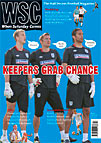 David Bartram gets a sense of perspective on outlandish claims about a country competing in their first World Cup for 44 years
David Bartram gets a sense of perspective on outlandish claims about a country competing in their first World Cup for 44 years
It’s July 11, 2010, and they’re celebrating on the streets of Pyongyang. North Korea have just won the World Cup. Well, not quite, but at least the people celebrating think they did. In reality, government officials have spent days tinkering with footage, editing out anything that reflects badly on the Democratic People’s Republic of Korea (DPRK). The 6-0 drubbing of the US in the final was particularly tricky, given that both sides crashed out in the group stages.
It sounds implausible, and almost certainly is. Over the past few months reports of the country’s World Cup preparations have sprung all manner of claims, most notably linking Sven-Göran Eriksson to the manager’s position. This was not without foundation. Sven did travel to the DPRK to talk football, although appointing a foreigner as manager was unlikely in a country that prides itself on the notion of Juche or self-sufficiency.
It was always going to be hard sorting fact from fiction as the world’s most secretive state prepares to make its first World Cup appearance for over 40 years. However, the truth is that this often dysfunctional country is a lot more normal when it comes to football than we may think.
Despite the rising tensions in the region caused by the alleged sinking of a South Korean warship by a North Korean torpedo, there’s little to suggest the World Cup won’t be enjoyed in North Korea like it is around the world. “There will be a massive buzz in North Korea during the World Cup,” says Nick Bonner, who runs Koryo Tours, a travel agency specialising in trips to North Korea. “Everyone watches the games and the World Cup will be the talking point on everyone’s lips.” There have been reports that South Korea will not provide a free World Cup feed to the North as they have before and suggestions that energy shortages will cause regular blackouts. But games, if not shown live, will likely be replayed to demanding fans.
North Korean football fans are not complete strangers to the World Cup. The DPRK shocked the world in 1966 by beating Italy on the way to a World Cup quarter-final. Despite leading Eusébio’s Portugal 3-0, they eventually lost 5-3, but were nonetheless welcomed home as heroes.
Nowadays the country has a passable football infrastructure, including a women’s team ranked fifth in the world and a men’s game with semi-professional first and second divisions.
Yet the game is unable to attract investment from outside North Korea, barely surprising given the reluctance of major sports companies to link themselves to an internationally condemned regime. After protracted negotiations, which included Spanish manufacturer Astore claiming they were tricked by an intermediary in China into selling the shirts used by North Korea in May’s friendly against Greece, it looks like Legea, an Italian sportswear company, will provide the DPRK kit in South Africa.
As North Korea cuts off diplomatic relations with the South, it would be naive to suggest that football could help improve deteriorating relations. But there are signs that North Korea recognises the cultural power the sport has globally. Last year Mark Rushton took his Beijing-based amateur football team, Chaoyang Park Rangers, to play an exhibition match against a North Korean university team. “The game was played in the national stadium in Pyongyang. It almost seemed like a diplomatic statement, as we were the first foreign amateur team allowed to play there, and the first team containing Americans to ever play in North Korea,” says Rushton. “The pitch itself was a gift to Pyongyang from North Korean leader Kim Jong-il, so it was clear that we were being shown a great deal of respect from our opponents.”
The North Koreans won the match 8-5 and Rushton recalls a good-spirited encounter against a well-worked team that played neat, passing football. “I’d never played in such a good-natured game before. There was definitely a sense that our opposition didn’t want to disgrace North Korea, but they also didn’t want to run away with the match. There seemed to be an understanding between the teams.” Although the Koreans accepted a post-match beer, they departed shortly after, suggesting that while the match was designed to build relations on the football pitch, they were under clear instructions not to take things too far.
Even the most nationalistic North Korean couldn’t have particularly high expectations for the upcoming World Cup. Drawn alongside Brazil, Portugal and Ivory Coast in the most difficult group in the tournament, a point would be considered respectable. But even a spirited performance might go some way to showing the world that behind the wall of North Korea’s despotic regime are a people who will be supporting their team just like the rest of us.
From WSC 281 July 2010